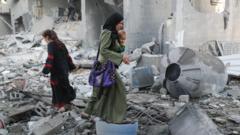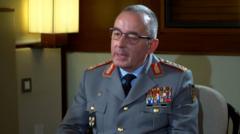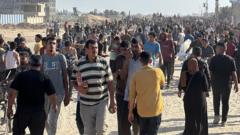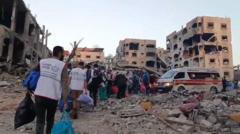A significant number of Israeli reservists are voicing opposition to the ongoing war in Gaza, urging Prime Minister Netanyahu to prioritize the safe return of hostages over military operations. This dissent, reflected in open letters and protests, highlights a growing division within Israeli society regarding the government’s war strategy.
Growing Dissent Among Israeli Reservists Calls for Shift in Strategy on Gaza War

Growing Dissent Among Israeli Reservists Calls for Shift in Strategy on Gaza War
As the Gaza conflict continues, increasing numbers of Israeli reservists advocate for a ceasefire and focus on hostage negotiations, prompting scrutiny of Prime Minister Netanyahu's approach.
Israeli reservists are increasingly speaking out against the ongoing war in Gaza, as pressure mounts on Prime Minister Benjamin Netanyahu's government to shift focus towards negotiating the release of hostages held by Hamas. The conflict, which once garnered widespread support among the Israeli public, is now facing significant opposition from within the military ranks.
In recent weeks, thousands of reservists from various branches of the military have signed letters urging the government to end the fighting. Notably, Danny Yatom, a former head of Israel’s intelligence agency Mossad, is among the prominent figures advocating for a ceasefire. Yatom accuses Netanyahu of prioritizing his own political interests over the lives of hostages, asserting, "We came to the conclusion that Israel is going to a very bad place."
The initial letter, signed by over 1,000 air force reservists, expressed a consensus that the ongoing war threatens the lives of hostages, with the signatories imploring the public to take notice before it's too late. The total number of military reservists who have voiced disapproval of the war has surged to over 12,000, encompassing elite fighting units and former commanders.
As hundreds of thousands of reservists initially responded to the call for service following the outbreak of conflict on October 7, recent reports indicate a staggering drop in reserve attendance, now averaging only 50-60%. This notable decline raises concerns of an unprecedented crisis for the Israeli military, reminiscent of the resistance faced during the first Lebanon war.
Reservist "Yoav," who served in Gaza previously, expressed his changing perspective on the conflict, stating, "I believed I was doing something good. Complicated but good. But now, I don't see it in the same way anymore." He, alongside many other reservists, believes that the government’s insistence on continuing the war detracts from addressing pressing humanitarian needs, particularly with the lives of hostages at stake.
Recent opinion polls reflect a shift in public sentiment, now favoring a ceasefire and a focus on hostage negotiations rather than continued military action. Protests across cities have seen demonstrators displaying images of both Israeli hostages and Palestinian child victims of the war.
The protests have provoked a response from the government, with Netanyahu dismissing the dissenters as a "small handful" of fringe elements. Despite such dismissals, the visible unrest in the streets and the emotional appeals from military reservists indicate a significant faction within Israeli society is calling for a reevaluation of the country’s approach to the ongoing conflict.
As the debate intensifies around the best course of action, the future of the Israeli approach to the Gaza war remains uncertain, and the imperative to save hostages continues to be a rallying point for many within the nation.




















